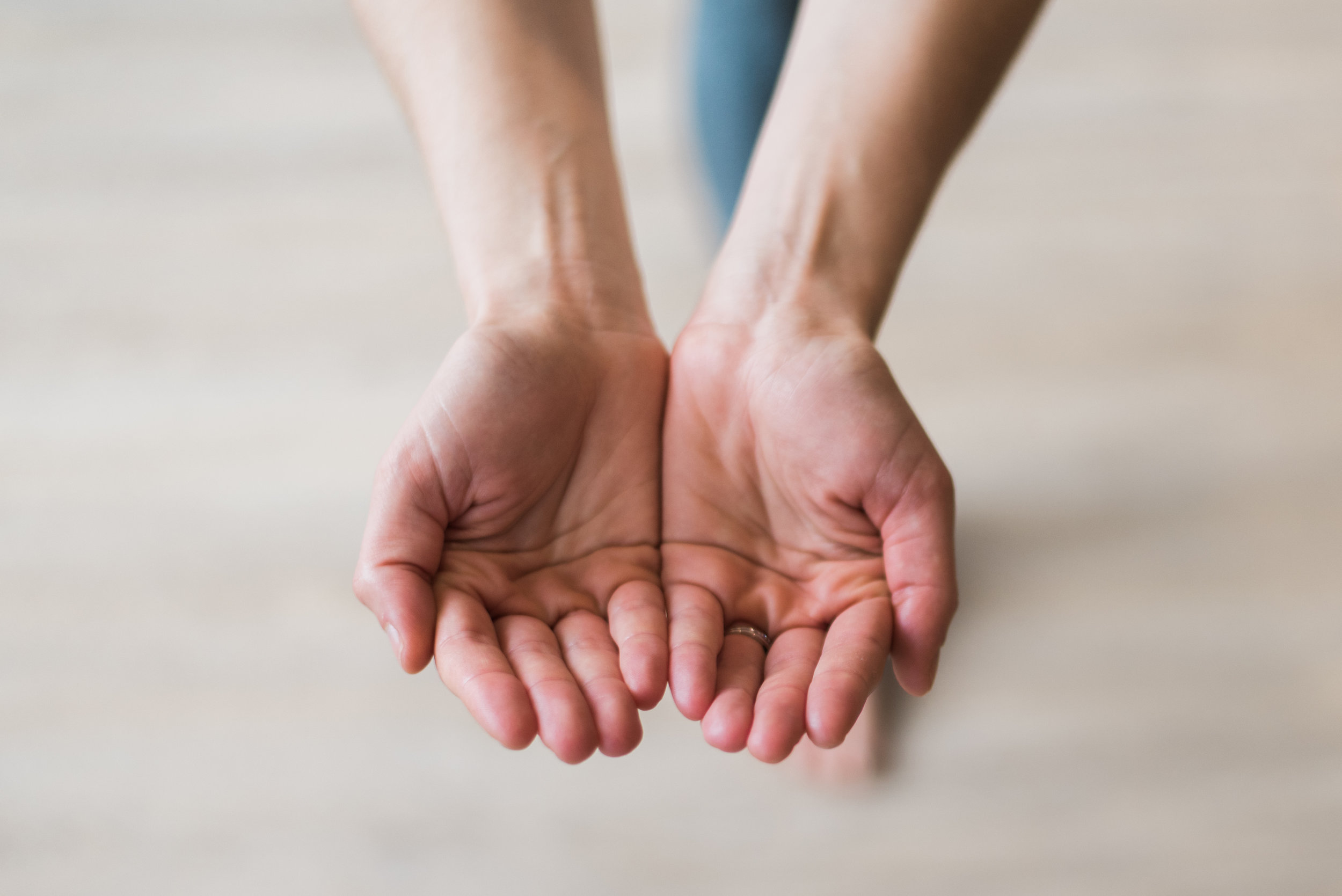Asteya
Asteya (A- non, Steya- Stealing)
by Amber Scriven
This month’s Yama is all about not stealing from ourselves and others. “EASY! Let’s all go home! Woot, Woot!” Unfortunately, Yoga is not that simple. WE ALWAYS GO DEEPER. When we explore what is underneath the concept of non-stealing, it expands quickly past pick-pocketing, fraud, and politics. It digs into stealing time, energy, creativity, truth, and growth from yourself and others. We explore the nuances of stealing both your own or someone else's sense of wonder, joy, relaxation, grief, loss, happiness, or loneliness—ultimately, stealing life and health. Asteya is about how we treat ourselves and the people closest to us, emotionally. It is one of the foundational ethics for how to live a happier life—NOW!
How & Why We Steal
When we boil it down, humans steal time and resources and take emotionally from ourselves and others all the time. When we steal it is usually rooted in one or more of the following 5 causes: Exhaustion, Pleasing Others (“Lack”), Survival (“Fear”), Ego, and/or Greed. Each of these topics is vast, so let’s simplify. Don’t panic yogis—a lot of theft is unwitting, and in yoga there is a “remedy” for every causative factor. Once we can honestly identify where in life we all steal from ourselves and others, we can begin to heal those wounds and change how we interact with ourselves, our loved ones, and the world at large, bringing a deeper sense of happiness—RIGHT AWAY. First, we must take a brief look at the types of theft and the likely underlying causes, or reasons. Only when we have been honest about this can we look at, and understand, how to use the remedies.
Types of Theft
Theft of Time:
We steal time from ourselves and others in many ways: being continually late for someone or staying late at work so often that it causes us to see less of the people that we go to work to provide for; never using that vacation time you earned; overworking so that your health is affected and detracts health-full days, or even years, from your life. Being late all the time may be that we are lazy. But tardiness can also occur as a result of Ego—“I don’t need to rush for you (or myself).” Most of the time, however, we are late because we are overstretched and exhausted. Either way, we are stealing from the person we are late to meet and from ourselves for spreading ourselves too thin. Overworking and over-scheduling could be caused by Fear (“I don’t want to lose my job”), or by “Lack” (a sense of insufficiency and a desire to please others, e.g., “I can’t support my family without this,” or “I’m not good enough and they won’t like me if I don’t do this”). Any of these will lead to Exhaustion, but Exhaustion is not the actual cause, so sleep won’t remedy it. At the bottom is Fear and Lack; a sense that we are not enough as is, which is just NOT TRUE, and we will look at the remedies soon.
Theft of Resources:
Being wasteful with our resources on the planet and in your own home (water, garbage, extra food, plastic, rainforests, the ocean) is theft from the planet and other living beings. It is also theft from our own future and that of our children. Chronic wastefulness usually stems from Ego and Greed. Occasionally we can catch Exhaustion throwing something recyclable in the trash, but usually it is Greed that allows us to overuse. When we start considering who exactly we are stealing from in these situations, we are able to curb our behavior. For example, every time I use a plastic straw, I think about the poor seal on You Tube who had one jammed so far up his nose that it lodged in his brain. This seal was having major headaches all so someone could sip their iced tea conveniently for 5 minutes.
Emotional Theft:
When we are busy, stressed, excited, or tired, being there for someone else becomes very challenging. We are easily distracted by our own discomfort or forward momentum. Being wrapped up in self, even if it’s for great reasons, is Ego. Emotional Theft is dangerous because it is subtle in the moment, but has a giant ripple effect. One example is not listening to someone voice their concern, worry, grief or joy over something, or interrupting someone when they are attempting to communicate with you, possibly even changing the story to one of your own out of enthusiasm. All are forms of emotional theft due to Ego. They often go unnoticed in the moment, but accumulate into a direct message that the being in front of or with you is not as important as you. This type of emotional theft can suppress someone else’s joy, ability to flourish, creativity, or need to vent. It makes them feel that they are not good enough and feeds their own sense of Lack so that they go ahead and commit their own acts of theft unto others too! So, you see, every interaction is an opportunity to give, or take, emotionally from yourself, another person, and tons of other people. Another example of emotional theft is when someone we love is making a mistake, so we step in and “do it for them” - we are taking away their opportunity to grow. This kind of protection might be thought of as love, but often it is either Ego (“I can do this better”) or impatience from Exhaustion.
Understanding the Causes & Applying the Remedies
Causes: Ego and Greed
“I am better than you, I can do this better, I am more important.” Ego presses us to a feeling of competitiveness, which applies pressure and stress, which eradicate happiness quickly. We are left with only pressure that manifests as either: “I must stay on top!” or “I have been cheated!” Here we are stealing in two ways. First, we are stealing from our own sense of abundance and ability to enjoy the day in front of us. Second, we are stealing from the other individual by pressing her success down. All this is based in Ego and Greed, and the remedy is the same.
Remedy: Contentment
Mantra: “Be a forklift, always lifting others up.” - Yogi Bhajan
Focus daily on listening to another’s story. Enjoy someone else’s stories of celebration, and listen to them without interrupting, when they need an ear. Refrain from comparing or referring to yourself. Let it be about them when it is their turn.
Practice gratitude for what you have in each moment. Write down 5 things about your day that you are grateful for.
Causes: Exhaustion, Lack, Fear
First, we must ask, “why am I so exhausted?” Is it overwork, over-scheduling, not eating properly, lack of sleep, stress? Then ask, “why am I committing such an unkind act to myself?” Is it fear of paying bills? Is it a sense of Ego or Greed? Perhaps you do not feel you are enough and need to prove yourself? Why are you not eating well or sleeping well? You know the answer. Be honest.
“I am not enough, there is not enough, I will run out, my family will run out.” This is deep-seated Fear rooted in a sense of Lack.
Living in a state of Exhaustion or with a sensation of Lack or Fear cultivates our basic instinctual needs and drives us into “survival mode.” Most of our “survival mode” feelings are exhaustion. So, why are you driving yourself so hard? Fear? Lack? Both?
Remedy: Trust
Mantra: “I am Enough, I am Whole, I am Abundant.”
To combat Fear, we have to build courage. To have courage, we have to have self-trust. When we trust ourselves implicitly, we do not feel lack, we feel like we are enough, and we trust we can survive because of this. So how do we re-learn how to trust?
Commit to a new (rejuvenating) routine every day. Stick to it! It could be as simple as washing your face before bed every night. These accountability routines birth self-trust.
Follow through. If you make plans, show up for them. When others trust you will show up for them, your confidence grows.
BUT, also take time for you. Stop over-scheduling and spend a day in nature. Use your vacation time. Take an hour in peace every day. You do not need to please anybody else.
Health and happiness are not derived from exhaustion. Whether stealing a potato to feed your family, or staying late at work nightly to pay the mortgage, this behaviour is DETRACTING from your own happiness and life.
Try it out!
When we understand why we do something, we can begin to change it. Where do your acts of theft stem from? Try out the mantra and remedies for one of the causes of theft that is showing up for you and see how living in Asteya can change your happiness level right away.
Incorporate Asteya into your daily living:
Start by asking yourself honestly, what are 3 ways in which you steal from yourself and 3 ways you steal from others?
Identify which of the 5 causes is contributing to that type of theft. Be honest.
One cause will likely show up more than the others. That is the set of remedies to work with first.
Meditate on the purpose of living with non-stealing. What rings true? What works?
Incorporate Asteya into your yoga practice:
Each Yama and Niyama has poses (asanas) and hand gestures or shapes (mudras) associated with it as well as a mantra (sanskrit phrases or prayers). Try practicing the pose or the mudra while thinking about Asteya or while repeating or chanting the mantra. Warrior 3 is the pose linked to Asteya. From crescent lunge, shift your weight into your front leg and launch into Warrior 3. Root down into your standing leg and allow your extended back leg to soar toward parallel with the earth. Arms can be outstretched in Hasta Mudra (see below) or spread like wings parallel with the floor. Feel the stability and strength in your lower body; press back through the heel of the lifted, extended leg and extend through the crown of your head, sending energy out in both directions.
Hasta (hand) mudra is associated with Asteya. Reach your arms out in front of you and radiate your palms open toward the sky. Create a gentle bowl with your palms touching pinkie side to pinkie side. Let this be an offering of giving and receiving; keep your heart and mind open as you give and receive, inhale and exhale. Release your fear of not having enough.
The mantra linked with Asteya is “Om shrim lakshmiyei namaha.” As you repeat this mantra, tap into the power of Lakshmi, the goddess of light and abundance. Like Lakshmi, if you believe you have all you need, you won’t need to take it from someone else. Repeat this mantra while holding Warrior 3, while practicing Hasta mudra, or when you find yourself in an environment where the temptation to “take” arises. Explore Asteya in mind, body, spirit and see where it takes you.
Love learning about the Yamas and Niyamas? Be on the look-out for Amber’s “Yamas From the Heart” online training in May and her upcoming Soul Medicine Retreats and Workshops on her website.
Be happy. Be well. Be peaceful. Be free. Thank you for reading. We’ll be back next month as we dive into the fourth Yama of Brahmacharya , or non-excess.
Copyright 2019 Metta Yoga, LLC


